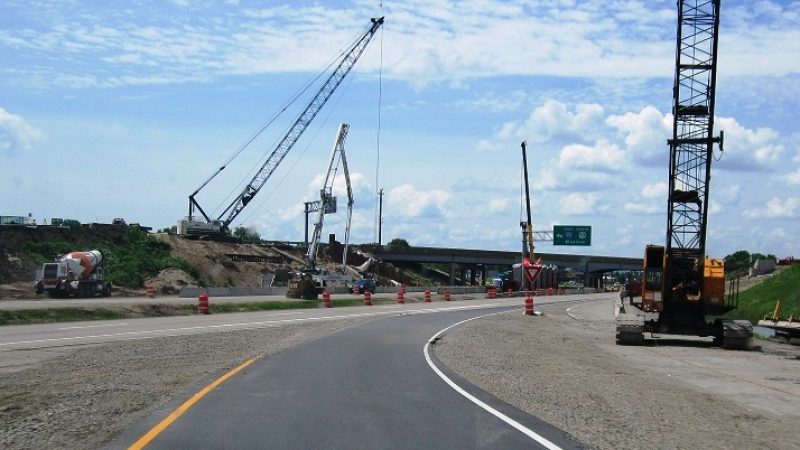DOT Secretary Craig Thompson says the transportation budget recently approved by the Joint Finance Committee is “far more responsible” than the past five, despite JFC Republicans rejecting Gov. Tony Evers’ proposal to increase the gas tax.
Still, he said that proposal — which would increase the gas tax by 8 cents and index it to inflation going forward — is “the preferable way to do it.”
Earlier this week, Republicans on JFC approved increasing fees and cutting breaks for retailers to help put $483.7 million of new money into transportation over the next two years, while borrowing $326.2 million for projects.
“If you look at what we proposed with the 8-cent increase to the gas tax and indexing that, that is in line with what 30 other states have done in the past five years — including some of the reddest, most Republican states in the country,” Thompson said at a June 13 WisPolitics.com issues luncheon at UWM’s Waukesha campus.
>> WisPolitics is now on the State Affairs network. Get custom keyword notifications, bill tracking and all WisPolitics content. Get the app or access via desktop.
He said the guv’s proposal would cost the average driver about $4 more per month. But he noted some of that tax would be levied on “Bears fans, and Lions fans and Vikings fans coming into the state.”
Thompson also added the proposal would have an administrative fee of less than 1 percent.
“For those reasons, that’s why we proposed to do it the way we did,” he said. “But what the JFC did is ongoing fees, and it’s in the Transportation Fund, and it would be constitutionally protected as well. So I think we need to be open to finding middle ground.”
Rep. Joe Sanfelippo argued Evers’ gas tax proposal wouldn’t be sustainable, and says he would prefer “a more permanent solution.”
“I also don’t agree with the concept that only the people who actually drive on the roads and use them should pay for them and benefit from them,” the New Berlin Republican said. “Every single person in the state of Wisconsin benefits from a good infrastructure system, whether you drive or you don’t.”
JFC has finished its work on the full budget, and Sen. Majority Leader Scott Fitzgerald said he will be meeting with members Tuesday to see where they stand on the document.
During yesterday’s luncheon, panelists lambasted a recently floated proposal to take some of the budget surplus and distribute it evenly among counties and towns in the state.
The proposal came from 10 Senate Republicans. They proposed taking $133.6 million of the $753 million surplus and funneling it into road work, providing each county with $1 million and each town $1,000 per mile of road in its jurisdiction.
“When I read the proposal, I thought oh, they’re not serious,” said Rep. Debra Kolste, D-Janesville, a member of the Assembly Transportation Committee.
She said the idea “doesn’t make sense,” as counties with large metro areas would get less than a dollar per resident, while smaller counties would get as much as $80 per resident.
Sanfelippo, a Transportation Committee member, says he broadly supports putting any additional money into transportation. But he doesn’t support the specifics of that GOP plan, as it would treat every county the same.
“The fire department puts water where the fire is,” Sanfelippo said. “We need to spend our transportation dollars where the traffic is, where the need is — and that’s primarily the southeast part of the state.”
Waukesha County Executive Paul Farrow agreed that “it’s always great to get money.” But he pointed out that $1 million would only go toward fixing about 9 miles of roads, while the county has thousands of miles of roads it has to oversee.
He said the $1 million would be “a nice BandAid, but right as we’re still speaking with the levy limits and everything else. … We’re still going to need more transportation aid than we’ve been getting.”
Thompson, who worked for the Wisconsin Counties Association for 16 years, says he understands counties’ need for more public funds.
But he said the idea of giving every county a flat allotment “doesn’t make a lot of sense to me.”
“I don’t think that proposal was as well thought-out as it needs to be,” he said. “There’s ways that if we were going to do it, we could do some analysis and spend it in a wiser way than that.”
Sanfelippo said the state should look at “sustainable sources of revenue going forward that will grow — which includes the tolling option.”
Thompson agreed, noting that tolling would capture money from out-of-state visitors. And he said the administrative costs of tolling are coming down due to new technologies.
“I think it’s something we should look at,” he said.
Thompson also said a mileage-based fee, otherwise known as a vehicle miles traveled tax, should be explored as a long-term option.
JFC Republicans included $2.5 million in the transportation budget for a study on moving to a VMT tax system. Thompson said the study can help Wisconsin understand VMT better, but he also identified some challenges with that route, and said he’d prefer to approach the issue at the national level.
He explains that monitoring vehicles’ mileage could be done through GPS but said that’s costly and noted people would have privacy concerns. But even a “low-tech” VMT system with some level of self-reporting could cause problems, he said, as it could be difficult to determine how many miles were driven in-state versus out-of-state.
“VMT conceptually I think makes the most sense… but there’s a lot of administrative hurdles in actually implementing that,” Thompson said.




